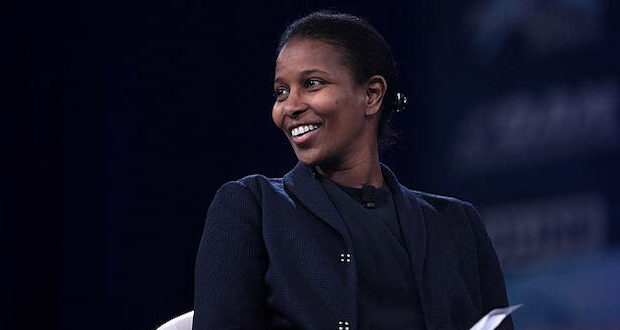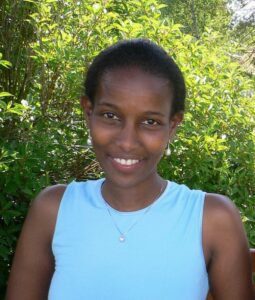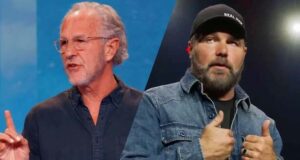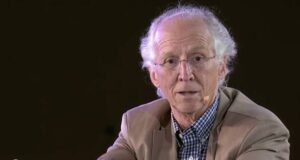Ayaan Hirsi Ali, a former Muslim-turned sharp critic of Islam and then vocal atheist, has gone through a new conversion — revealing that she’s now a Christian.
“I still have a great deal to learn about Christianity,” she wrote in an essay published on Monday at the British website Unherd. “I discover a little more at church each Sunday. But I have recognized, in my own long journey through a wilderness of fear and self-doubt, that there is a better way to manage the challenges of existence than either Islam or unbelief had to offer.”
Hirsi Ali, 54, did not say which Christian denomination she was now a member of and did not reveal which church she attends.
Hirsi Ali has been a critic of Islam — the religion she was raised in — which led to death threats. She became the victim of female genital mutilation as a child in Somalia. After surviving a civil war and an arranged marriage, Hirsi received political asylum in the Netherlands.
She later served as a member of Parliament in her adopted country from 2003 to 2006, where she publicly renounced her Muslim faith. In 2004, Dutch filmmaker Theo van Gogh collaborated with Hirsi Ali on a short film called “Submission,” detailing the abuse and mistreatment of Muslim women.
As a result, both received death threats. Van Gogh was murdered in November 2004 by Mohammed Bouyeri, a Dutch-Moroccan Islamist who had objected to the film. Three years later, Hirsi Ali helped establish the AHA Foundation, which works to protect women’s rights in the West from those suffering religious oppression.
Hirsi Ali’s journey from Muslim to atheist to Christian reflects the current cultural and political moment.
“To understand why I became an atheist 20 years ago, you first need to understand the kind of Muslim I had been,” she wrote. “I was a teenager when the Muslim Brotherhood penetrated my community in Nairobi, Kenya, in 1985. I don’t think I had even understood religious practice before the coming of the Brotherhood. I had endured the rituals of ablutions, prayers and fasting as tedious and pointless. The preachers of the Muslim Brotherhood changed this. They articulated a direction: the straight path. A purpose: to work towards admission into Allah’s paradise after death. A method: The Prophet’s instruction manual of do’s and don’ts — the halal and the haram. As a detailed supplement to the Quran, the hadeeth spelled out how to put into practice the difference between right and wrong, good and evil, God and the devil.”
The essay comes as the war between Israel and Hamas has entered a fifth week following the Oct. 7 attack. Pro-Palestinian protests, some of which have been violent, have popped up across the West. At the same time, cases of antisemitism have also seen large increases in the United States and other parts of the world.
Hirsi Ali, who works for the Hoover Institution at Stanford University and the American Enterprise Institute, recalled that “the most striking quality of the Muslim Brotherhood was their ability to transform me and my fellow teenagers from passive believers into activists, almost overnight.”
“We didn’t just say things or pray for things: we did things,” she said, adding that a “special hatred” was reserved for Jews.
Hirsi Ali noted, “You can see why, to someone who had been through such a religious schooling, atheism seemed so appealing. … I also found an entirely new circle of friends, as different from the preachers of the Muslim Brotherhood as one could imagine. The more time I spent with them — people such as Christopher Hitchens and Richard Dawkins — the more confident I felt that I had made the right choice. For the atheists were clever. They were also a great deal of fun.”
Why convert to Christianity now? Hirsi Ali, who has hinted at this conversion in recent public appearances, said the rise of militant Islam, China, Russia and wokeism were all factors.
“Part of the answer is global,” she noted. “Western civilization is under threat from three different but related forces: The resurgence of great-power authoritarianism and expansionism in the forms of the Chinese Communist Party and Vladimir Putin’s Russia; the rise of global Islamism, which threatens to mobilize a vast population against the West; and the viral spread of woke ideology, which is eating into the moral fiber of the next generation.”
READ: Do non-Christians celebrate Christmas?
Hirsi Ali said that the differences between Islam and Judeo-Christian tradition are simple.
“Unlike Islam, Christianity outgrew its dogmatic stage,” she wrote. “It became increasingly clear that Christ’s teaching implied not only a circumscribed role for religion as something separate from politics. It also implied compassion for the sinner and humility for the believer.”
Hirsi Ali said the freedom Western nations enjoy compared to majority-Muslim ones is another reason for her conversion. She said the “God-hole” left by the church’s diminished influence in Western life and culture has caused a void.
“Atheism failed to answer a simple question: What is the meaning and purpose of life?” she said, adding that “the void left by the retreat of the church … has merely been filled by a jumble of irrational quasi-religious dogma.”
From ReligionUnplugged. Published with permission.
–Clemente Lisi is the executive editor at Religion Unplugged. He is the author of “The FIFA World Cup: A History of the Planet’s Biggest Sporting Event” and previously served as deputy head of news at the New York Daily News and a longtime reporter at The New York Post. Follow him on Twitter @ClementeLisi.
Photo: WikiCommons Media. Gage Skidmore from Surprise, AZ, United States of America
 Metro Voice News Celebrating Faith, Family & Community
Metro Voice News Celebrating Faith, Family & Community 








